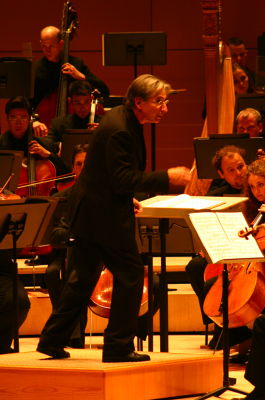New World Symphony opens season with fiery showpieces
 Attendants in the lobby offered free flutes of champagne. The house was sold out, with a waiting list for returned tickets. The conductor raised his baton, there was a drum roll and everyone rose for The Star-Spangled Banner.
Attendants in the lobby offered free flutes of champagne. The house was sold out, with a waiting list for returned tickets. The conductor raised his baton, there was a drum roll and everyone rose for The Star-Spangled Banner.
Opening night of the season is a big occasion for any orchestra, but for the New World Symphony it always comes with a question mark. Since the orchestra turns over a third of its members every year, as the young conservatory graduates complete three-year fellowships and take jobs in the real world, how will the 30 new members perform?
Judging from Saturday’s concert of orchestral showpieces at the Lincoln Theatre led by artistic director Michael Tilson Thomas, the orchestra’s admissions standards remain rigorous. Strings were brilliant and accurate in Mussorgsky’s Night on Bald Mountain, (directed by conducting fellow Edward Abrams), and in Berlioz’s Roman Carnival Overture. The brass section was especially impressive—powerful, resonant and well-balanced. Ravel’s Daphnis and Chloe Suite No. 2 provides a real workout for the winds, with several difficult, exposed solos, and the flute and clarinet met the challenge while still bringing out the work’s sensuality.
The rapport of Tilson Thomas, music director of the San Francisco Symphony, with the young musicians was evident throughout the performance. Founded by the conductor in 1987, the New World Symphony takes recent graduates of Juilliard, the New England Conservatory, Curtis and other top schools and gives them three years of training and performance opportunities before they move on to jobs at professional orchestras. Among the coaches are section leaders from the top orchestras in the United States.
 The young Siberian violinist Mikhail Simonyan appeared as soloist in Alexander Glazunov’s Violin Concerto, a work of suave melodies and virtuoso fireworks that deserves to be heard more often. What was most striking about his performance was not his silky tone or technical skill—evident as he tossed off the difficult passages with a faint smile and no trace of effort—but his extraordinary sensitivity to the orchestra. At moments, he leaned in to the first violin section, as if playing a duet with them, and subordinated his playing at times when the orchestra took up the principal melodies.
The young Siberian violinist Mikhail Simonyan appeared as soloist in Alexander Glazunov’s Violin Concerto, a work of suave melodies and virtuoso fireworks that deserves to be heard more often. What was most striking about his performance was not his silky tone or technical skill—evident as he tossed off the difficult passages with a faint smile and no trace of effort—but his extraordinary sensitivity to the orchestra. At moments, he leaned in to the first violin section, as if playing a duet with them, and subordinated his playing at times when the orchestra took up the principal melodies.
There was nothing heavy and Germanic on the program, just a series of brilliant works that allow each section of the orchestra to show off its abilities or expose its shortcomings. There were a couple of ragged entrances in the winds and brass, and the playing at times was a bit too careful, lacking in the Mussorgsky, for example, any edge of uncivilized intensity. But in general, it was an impressive debut for the newly reconstituted orchestra.
Posted in Performances
Leave a Comment
Sun Oct 11, 2009
at 12:45 pm
No Comments






